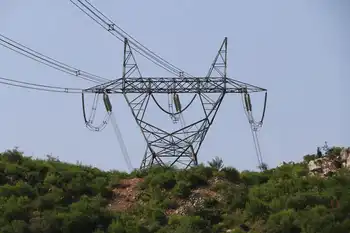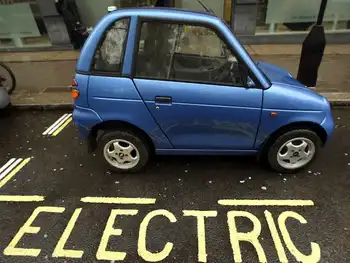Kyoto deal will transform Canada, Dion says
OTTAWA, ONTARIO - Canadians likely won't recognize their country after economic and environmental changes sparked by the $10 billion Kyoto greenhouse gas plan, federal Environment Minister Stéphane Dion predicted.
New housing subdivisions would be specifically designed to save energy, vehicle use slashed through telecommuting, carbon dioxide from the tar sands pumped underground and renewable energy, including wind power, would burgeon.
Dion said Canada's economy would be transformed by Kyoto because government, business, municipalities and individuals will be buying and selling credits for reducing emissions of carbon dioxide, the leading greenhouse gas.
Cutting greenhouse gas emissions by 270 million tonnes annually during the Kyoto period from 2008 to 2012 will mean "a lot more energy efficiency, energy security, less waste, more composting, more recycling."
This "carbon market" will get a big boost from $1 billion worth of purchases by the federal government under a fund announced earlier this year.
Ottawa is also proposing to share costs on climate change projects that provinces identify as their priority.
"In 2012, we may not recognize our country — how much it will be better for energy efficiency and greenhouse gas reductions and other improvements," Dion said.
The environment minister also announced that the federal government has earmarked $260 million over four years as additional support for international climate change efforts, including two new research networks and Canadian participation in a global earth observation system.
The global system, championed primarily by the U.S., is intended to link existing environmental monitoring by satellites, aircraft and ground stations of everything from the shrinking polar ice cap to potential tsunamis. Further details about where the new money will be spent are expected soon.
The minister's remarks were seen here as part of the government's attempt to counter the latest news that Canada has the worse pollution record among the industrialized developed countries that have agreed to reduce greenhouse gas emissions below 1990 levels under Kyoto.
"Canada is the sole Kyoto country that has an oil and gas industry that is booming," Dion said when asked why greenhouse gas emissions here had soared 24 per cent since 1990.
In the same period, the U.K. has reduced greenhouse gases by 13 per cent, France has dropped by 2 per cent and the U.S., which didn't sign Kyoto, has risen by 13 per cent, according to a report released yesterday by the U.N. Framework Convention on Climate Change.
Dion is president of that U.N. body for the next year because Canada is the official host of a major climate change conference in Montreal starting Nov. 28 that is expected to attract as many as 12,000 participants from 190 countries.
Dion said he would eschew campaigning in a federal election to focus on getting the Montreal meeting to approve Kyoto reforms and launch new treaty talks.
Related News

NDP takes aim at approval of SaskPower 8 per cent rate hike
REGINA - The NDP Opposition is condemning the provincial government’s decision to approve the Saskatchewan Rate Review Panel’s recommendation to increase SaskPower’s rates for the first time since 2018.
The Crown electrical utility’s rates will increase four per cent this fall, and another four per cent in 2023. According to a government news release issued Thursday, the new rates will result in an average increase of approximately $5 on residential customers’ bills starting on Sept. 1, 2022, and an additional $5 on April 1, 2023.
“The decision to increase rates is not taken lightly and came after a thorough review by the…




